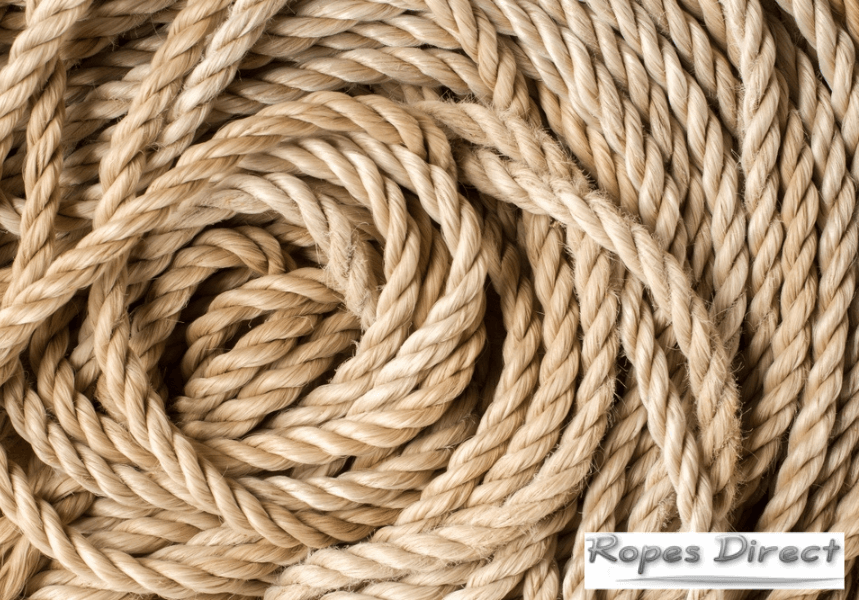Prefer to keep things au naturel?
We hear you.
Yes, synthetic ropes do have a lot going for them, especially for outdoor uses. But sometimes, you just can’t beat the look and feel (and environmental benefits) of a natural rope.
The question is, which is the right one for your needs?
Here at RopesDirect – as a leading online rope supplier – we have a wide selection of natural ropes to choose from. And we agree, without any background knowledge, they can all seem pretty similar. Sandy brown in colour, quite hairy in texture, with multiple strands twisted together.
It can be tricky to know which is best suited to your specific requirements. So to help, here we explore our full line-up of natural ropes in greater detail and highlight the qualities of each.
Our online collection of natural ropes
Find the natural choice for your requirements.
Flax hemp
The strongest of the bunch

If you’re looking for a tough cookie, flax hemp is the rope for you.
This is made using fibres extracted from the stems of the flax plant (also known as the common flax or linseed) – which are recognised as some of the strongest natural fibres on the planet. When spun into multi-strand threads, they form the basis of a particularly strong and sturdy rope.
Aside from its inherent strength, flax hemp is also known for being:
- resistant to heat and UV rays
- extremely durable
- flexible and easy to knot
- buoyant
- soft and pleasant to touch
- biodegradable
It’s well-suited to many indoor and outdoor rope-handling applications, where strength and comfort are required in equal measure (e.g. stair bannister ropes, gymnasium climbing ropes, theatre scenery lifting and pulley ropes).
Our flax hemp is available in diameters ranging from 6-36mm. Starting from just 48p per metre (Feb 2024), it’s a reliable natural option for the toughest of jobs.
Manila rope
The best option for outdoor use.

Manila rope is better suited to outdoors use than some other natural ropes,
It demonstrates excellent levels of strength and fantastic knot retention, with knots much less likely to loosen or untie. It’s highly durable. Flexible. Resistant to direct sunlight and saltwater. And as it contains natural oils, it can withstand the elements much better than other natural options.
Traditionally, manila rope was used for ships rigging, mooring and other marine applications – including fishing nets and boat fenders. But these days it is used at home and commercially for fencing, decking, barriers and handrails, lawn edging, children’s play areas and rope-based exercise.
If you do opt to use manila outside, however, it’s important to keep in mind that it is a natural rope. Made from the fibres of the abaca plant – despite its strength and resilience – it will shrink when it gets wet. So we always recommend adding an extra 10-15% to the total length required.
Available to buy by the metre, on reels and in coils, in diameters ranging from 6mm to 60mm.
Sisal rope
The kindest to the environment.

Sisal rope excels in terms of its eco-credentials.
For a start, it’s derived from the agave sisalana plant. This typically reaches its maturity within 4-6 months – meaning crops can be replenished quickly and it’s an efficient and sustainable resource. Plus, it can grow without fertilisers or pesticides and has very little impact on the atmosphere.
Sisal fibres are 100% biodegradable. Rather than adding to landfill sites, they break down naturally in as little as 1-2 years, and release very low levels of volatile organic compounds.
Add in a range of other useful properties – such as strength, durability, UV resistance and very little stretch – and it’s easy to understand why sisal ropes have become a popular choice.
Farmers often use sisal as a chewing toy for pigs; it’s safe for pet birds such as parrots and it’s perfect for cat scratching posts. Gardeners tend to like it for its natural credentials too, it’s commonly chosen for domestic garden projects, including decking and timberwork.
Starting from just 24p per metre, or £31.92 for a 220m coil (Feb 2024), sisal is an affordable and convenient option if you’d like to invest in a natural rope – that does everything it can to be kind to nature.
Cotton rope
Perfect for indoor use.

A natural rope, that comes into its own indoors rather than out…
Cotton rope has a number of properties that make it perfect for ‘light load’ indoor applications.
For example, it’s:
- soft to touch
- lightweight
- malleable and easy-to-handle
Plus it demonstrates excellent knot-ability.
As a result, it’s most commonly used for handicraft hobbies – particularly macramé – and for making a range of decorative and day-to-day items (such as jewellery, accessories, pet toys, animal halters etc.).
Manufactured to the highest quality and sold either unbleached and colour-free, or checkout our wonderful range of dyed cotton cords – perfect for craft projects. Our cotton ropes are currently available from just 30p per metre (Feb 2024), making them a low-cost ‘natural’ choice. And we have lots of ideas on how they can be used in our blog.
Still not 100% on which 100% natural rope to buy?
Further information on our natural ropes can be found throughout our website, particularly in our ‘Help Choosing Rope’ section and on the individual product pages. So if you’re still unsure which is the best type for your requirements, it’s worth taking a look around to find out a bit more.
If (after all that information overload!) you’re still feeling a little uncertain, you can also get in touch.
Whether you’re struggling to decide on the right natural choice for your project, or would like to discuss a bespoke length or bulk order, we’re always on hand and happy to help. Just send a message via our online form and a member of the team will respond to your enquiry as soon as possible.

